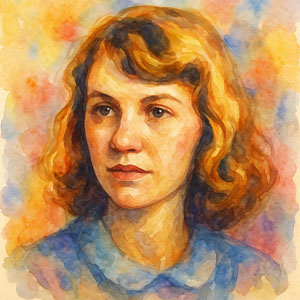 For a brief time in October, four months before her death, poet Sylvia Plath (1932–1963) rose from sleep in the still, blue hour between 4 and 8 a.m., that time when darkness and silence blend to welcome the dawn.
For a brief time in October, four months before her death, poet Sylvia Plath (1932–1963) rose from sleep in the still, blue hour between 4 and 8 a.m., that time when darkness and silence blend to welcome the dawn.
In this quiet space she wrote eleven poems in seventeen days — astonishing bursts of inspiration. She told her mother, “I am a genius of a writer. I have it in me. I am writing the best poems of my life; they will make my name.”
She was right. Her poetry did make her name, posthumously. Plath left words of brilliance and poignancy, capturing a vivid and fragile inner world. A tragic figure who shared the burning pain in her heart with others, she became a magnetic cultural phenomenon and a martyr-saint to a devoted circle of readers.
“That's where writing comes in,” she wrote in her journal. “It is as necessary for the survival of my haunty sanity as bread is to my flesh.”
An excellent student and perfectionist, Plath was born in Jamaica Plain, Massachusetts. She married British poet Ted Hughes in 1956 while studying in England on a Fulbright Scholarship. With two small children, her marriage, along with her health, unraveled in 1962.
Of it, Hughes later said, “What happens in the heart simply happens.” Named Poet Laureate of England in 1984, he added, “Maybe all poetry, insofar as it moves us and connects with us, reveals something the writer does not want to say but desperately needs to communicate to be delivered of.” Plath’s *Collected Poems*, edited by Hughes, won the Pulitzer Prize in 1982.
She said, “Everything in life is writable about if you have the outgoing guts to do it and the imagination to improvise. The worst enemy to creativity is self-doubt.” Her courage to name pain and transform it into art continues to inspire writers and dreamers everywhere.
 Be gentle with yourself. ✨
Be gentle with yourself. ✨
